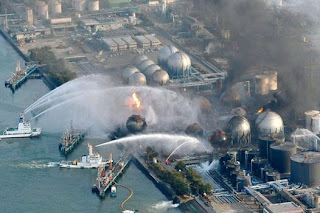March 11 after a powerful earthquake shook Japan leaving more than 10 000 deaths recorded to date, and the subsequent tsunami devastated, and the terrible danger of radioactive contamination of the affected product of several nuclear reactors. Personally I fully understand the impairment suffered by the earthquake because of a little over 25 years also suffered a powerful earthquake in Mexico City. If you ask me, I can say that I remember well the moment the quake. At that time studying at UNAM my degree, so that when the earthquake struck us was making me breakfast before leaving. I remember I was preparing a sandwich when I suddenly felt the ground shake. It took only a moments realizing that I was shaking, and immediately left the sandwich on the table and went to tell my brothers I was shaking. Obviously we all knew, because all the earthquake lasted nearly two minutes of shock after shock.
Now that was an earthquake in Japan, with colleagues remembered our memories of the earthquake in Mexico City, and everyone seemed to have super memories claritas and vivid. And then we wondered why the report allowed us to record these events as clearly, while other memories seem to be more obscured by time.
And this, what can be studied scientifically?
This question have made a number of researchers who have decided to approach experimentally. Now, as you never know when will an event of such dimensions that enable the mechanisms to form such memories as these labs have their formats only always ready to adapt to the event. For example, Ulric Neisser and Nicole Harsh took the crash of 28 January 1986 the ship Challenger, to implement their questionnaires. This event had live national coverage in the United States and was the news of the week. Everyone wondered, and what you as you hear the explosion of the Challenger?. In the morning the day after the explosion, and Harsh Neiser questionnaires applied to many students, of whom 44 were able to complete it a second time two and a half later.
For example, one student noted: "When I first Heard about the explosion I WAS sitting in my freshman dorm room with my roommate and we where watching TV. It came on a news flash and We Were Both totally shocked. I was really upset and I Went upstairs to talk to a friend of mine And Then I call my parents ". However, two and a half years earlier, in the morning immediately after the accident the same student wrote "I was in my religion and Some People classs Walked in and started talking about it. I did not Know any details except That It Had Exploded and the schooolteacher's students Had Been watching all Which I Thought Was So sad. Then after classs I Went to my room and watched the TV program talking about it and I got all the details from that ". After analyzing all the discrepancies of the 44 subjects who completed both questionnaires, these authors concluded that this type of flashbacks flashbulb type may be wrong, as even some subjects had completely forgotten their original experience, and more that researchers gave them keys to his original letter could not remember - but still had a "memory" lived according to them was true. In this phenomenon the authors called it "Phantom Flashbulbs."
In a more recent study, Jennifer Talarico and David Rubin, Duke University corroborated the findings of Neisser and Harsh, in a study after attacks on the Twin Towers in New York on September 11 2001. In this study published in Psychological Science in 2003, they found something surprising: the values \u200b\u200bof how visceral excitement of the event was correlated with how accurate they thought it was his recollection of the event months later, but not as accurate or that were consistent memories really. In other words, you have a memory so vivid that depends so much excitement you had at the time, but eventually the memory may have nothing to do with what actually happened.
So the way you remember your fifteenth birthday, your first statement or your first shock, do not necessarily agree with reality. No matter how vivid is your memory, you better have a photo or a video on hand to make sure that you believe to have lived, has become a reality. As the Treasury said some years ago ... slip talk!.





0 comments:
Post a Comment